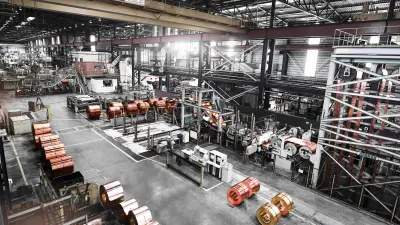Intelligent early fire detection safeguards people and property
The canton of Grisons is taking a new approach for improving fire protection in the legendary ice sports stadium in Davos, a resort town in the Swiss Alps. It is the first installation in Switzerland of a customized solution for networked early fire detection that employs artificial intelligence.
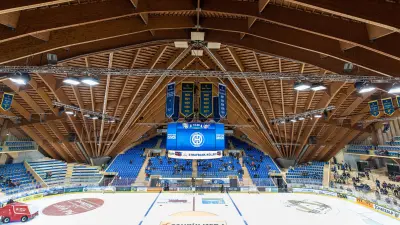
The Davos ice sports stadium is a genuine ice palace, an icon of ice sports whose fame extends far beyond Switzerland. Owing to its extraordinary timber frame construction and uniquely shaped roof with open pitched gables, it is widely regarded as one of Europe’s loveliest stadiums. Between 2019 and 2021 it was thoroughly renovated, a project that Bosch was invited to join.
From World Economic Forum to ice hockey events
The security requirements for the annual meeting of the WEF World Economic Forum, for which prominent politicians and entrepreneurs converge on Davos each winter, are extremely strict. They also extend to the arena, which in addition to events associated with the WEF World Economic Forum also hosts the world’s oldest invitational ice hockey tournament, namely the Spengler Cup, and the home matches of the Davos Hockey Club, which plays in the Swiss National League. For monitoring all of the outdoor and indoor areas and the streams of entering and exiting visitors, Bosch planned, implemented, and installed a state-of-the-art video surveillance solution. While the arena was being renovated, a networked fire alarm solution including AVIOTEC cameras for AI-supported early fire detection was deployed. Owing to the hall’s enormous size, unusual roof design, and major temperature gradients, conventional linear fire alarm technology would quickly encounter its limits there.
“We had already been contracted earlier to install video surveillance and fire alarm systems, and the stadium’s management was quite intrigued by our video-based early fire detection technology. It was very straightforward for us to set up and connect. Now all information comes together on a single system in the control room,” explains Frank Baumgartner, who works as a technician at Bosch Energy and Building Solutions in Switzerland. The deal was sealed after a practical test in which Baumgartner ignited a smoke cartridge in the fan block to demonstrate the solution to those in charge – and the video-based fire detection system immediately pinpointed the smoke source.
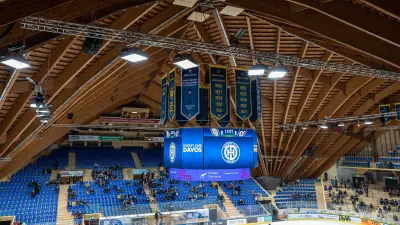
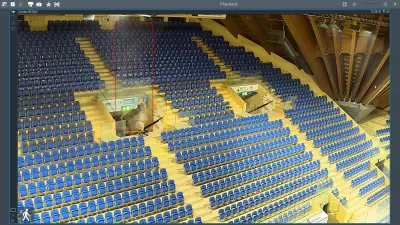
Intelligent early fire detection in real time
The special feature of the stadium in Davos is its distinctive roof construction. One of the reasons for renovating it was to update the fire protection system. Today, greater safety is ensured by new enclosed fire escapes, new access routes to the stands, and fire doors. Particularly in expansive buildings used to host events that are attended by large numbers of people and can become difficult to keep track of, early video-based detection is key for spotting incipient fires very quickly. AVIOTEC video cameras are used for this, for example in factory halls and shopping malls. They are able to detect traces of smoke in high-ceilinged interiors and analyze them in real time. Trained AI algorithms process the images in a fraction of a second to identify flames or smoke based on the typical characteristics of different kinds of fire. This intelligent solution also works reliably in challenging lighting conditions, including complete darkness, with the aid of separate infrared illumination; it can even distinguish between smoke and fog.
Fire and smoke sources are thus identified rapidly, and the alarm chain is also activated more quickly. The alarms go off sooner, people are asked to leave the building sooner, the fire doors shut sooner, and fire extinguishing starts sooner. Every second counts when it’s about saving lives and reducing damage. Which is why, after performing a test on site, the fire authorities of Grisons Canton decided to issue a permit for the technology to be used in the ice sports stadium as a special application. It was the first time that this innovative solution was implemented in a building in Switzerland.

We now sleep more soundly thanks to this new, intelligent solution for early fire detection.
German-Swiss teamwork accelerated project planning
In Davos, the Swiss branch of Bosch Energy and Building Solutions worked in close cooperation with Robert Rateike, who holds the position of Life Safety Portfolio Manager in Stuttgart and has specialized in the AVIOTEC video-based fire detection system and already successfully completed a large number of projects involving it, and their experienced Swiss colleagues. Ljubisa Jonovic, who heads the Swiss branch, explains that “here in Switzerland we’re a small but practiced team. And we all pitched in enthusiastically to implement this project.” Frank Baumgartner, Maurizio Migliore, and Samuel Hochstrasser made sure that it was implemented properly in Davos, while Rateike coordinated the work to develop a tailored solution: “Thanks to Frank Baumgartner and his strong team on site, we were able to do a good job on all the planning and development work in Stuttgart.”
In every project, comprehensive measurements, inspections, and analyses are followed by complex planning work that also draws on data provided by architects. In this case, not only CAD data on the building itself but also information on the loadbearing ability of the mounts for the stadium equipment played a role in designing the system. “We finished the actual calculations on a single afternoon,” says Rateike. “The bulk of the work is done up front while pondering possible solutions to pick out the best approach.” This calls for teamwork: technical knowledge, development expertise, and practical solutions, plus real pros to do the actual hands-on installation work. “But there’s much more to it than just hooking up the system. First, we have to identify the ideal positions for the cameras so all of the seating areas are in view. How many are needed, where should they be installed, and at what angles should they be pointed to reliably detect any fires?”
The next step is to set everything up so signals arriving from the cameras via the video management system and information from the fire detectors converge in a system that can be operated both from the arena’s control room and, when major events like the WEF World Economic Forum take place, also from the local police station. A cloud-based platform ensures that the system works consistently without any faults or glitches, even when no Bosch technicians are present on site. It enables remote access and networking to repeatedly tweak the system to meet the customer’s changing needs.
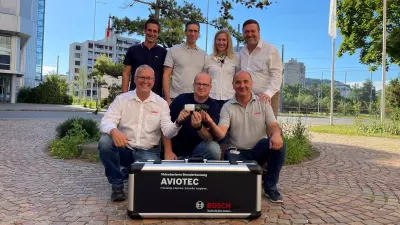
The potentials of the technology
There was a tight schedule for installing the solution, since sporting events were already taking place in the arena during the project planning phase. In May 2021, the 10 cameras were mounted on crossbars at a height of 15 meters, wired, switched on, programmed, and connected to the fire alarm system. The ceiling itself looms 36 meters about the floor. And then came the day of reckoning on which the system was put through its paces to see if the underlying idea lived up to its promise. For the test, a large smoke machine was driven in and parked in an area that, according to the project specifications, didn’t need to be covered by the system. But the cameras spotted the smoke anyway. The alarm went off, along with a PA announcement urging everyone to leave the building, while fire doors banged shut to keep the fire from spreading to adjoining parts of the building. The test confirmed that the arena with its extraordinary roof construction sets new standards with its fire protection system. Going forward, the team headed by Ljubisa Jonovic will be in Davos regularly to comply with long-term maintenance contracts for the fire detection and video systems.
Robert Rateike is enthusiastic about the future prospects of intelligent early fire detection and warning systems. “They have enormous potential. Not only for enormous buildings like airport halls and shopping malls, but also in roofed-over outdoor areas where paper, pallets, and other readily flammable materials are stored.” Michael Hamp, who is responsible for the Swiss branch, and Ljubisa Jonovic both see great opportunities in Switzerland: “This solution takes fire protection architecturally to a whole new level. We think that, with the project in Davos, we’ve very convincingly shown that it’s worthwhile to tread new paths with us. Another aspect that shouldn’t be overlooked is the uniqueness of the AVIOTEC camera, which sets us apart from other solutions around the globe.”


